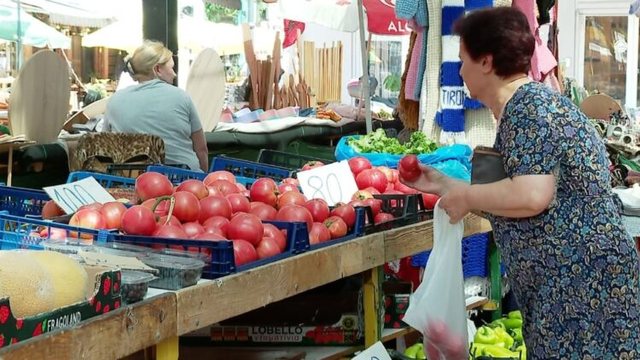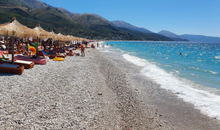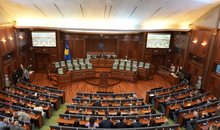
Inflation situation in Albania / We continue to pay more for food

Prices remain high, but the pace of growth is slowing. Inflation in May falls slightly, but citizens still do not feel relief in their pockets. Experts explain the reasons and warn of future risks from international developments.
Prices remain high, products are continuing to become more expensive...just not with the previous momentum. This is how the price trend for the past month can be summarized.
Inflation, the indicator of currency depreciation in the face of price increases, fell to 2.2 percent in May, from 2.3 percent in April. Compared to May of last year, it remains unchanged.
"These are the effects of imported inflation, which, given that there is a decline in the levels of the eurozone, but also beyond... in Albania's main partners. The second reason is related to the exchange rate... the depreciation of the euro," says economic expert Adrian Civici.
The emergence of domestic production has also contributed to low inflation, especially in consumer goods. The indicator fell to just 3.2 percent last month from 3.8 percent in April.
So, the prices of fruits, vegetables, dairy, meat and more continued to be 3.2 percent more expensive than in May 2024. The good news is that the pace of price increases slowed.
"Prices went up. Ok, okay. Oil went up, so come on. But oil went down. They're still stuck at that starting point," says a citizen.
So why don't prices go down once they go up?
"Prices tend to adjust much more quickly when costs increase, while when costs fall, the market is slower to reflect. This is also related to business expectations, lack of competition in some segments or even supply chains that react late," emphasizes lecturer Ardian Civici.
But the calm on the price front may not last. Experts warn that the threat of a new wave of inflation remains alive, especially due to geopolitical developments in the Middle East, Ukraine, and global trade tensions.
"Fluctuations in international oil prices, the increase in maritime transport costs due to conflicts, as well as tensions in food markets, are factors that could turn inflation into a new risk. Albania is exposed to these developments due to its dependence on imports," says Adrian Civici, lecturer and economics expert.
Even the Bank of Albania, in its latest statements, underlines that external risks have not passed, so monetary and financial policy remains on alert./A2CNN
Latest news



"We have facts", Vokshi: 20 SP MPs are gang representatives
2025-06-09 22:14:55
Spy novel legend Frederick Forsyth dies
2025-06-09 21:49:01


Two police officers finish testifying in the 'Banjska' case
2025-06-09 21:14:27

Skype is shutting down after more than 2 decades
2025-06-09 20:54:17
Inter officially presents new coach, Cristian Chivu
2025-06-09 20:43:51
Inflation situation in Albania / We continue to pay more for food
2025-06-09 20:32:02

Latvia-Albania, match without captain
2025-06-09 20:07:54
Residents clash with IKMT and police in Jalë: This is murder!
2025-06-09 19:47:24
Spaçi/ Former prisoners and young activists join forces to protect memory
2025-06-09 19:35:10
Surprising development in Kosovo, Kurti meets with Bedri Hamza
2025-06-09 19:16:07
57-year-old man in Postribë shot himself with a shotgun, transported to hospital
2025-06-09 19:05:03
SPAK summons Sali Berisha tomorrow
2025-06-09 18:44:58
Loredana Brati breaks the silence about Jozi's new romance
2025-06-09 18:33:10

Are single women happier than single men?
2025-06-09 18:18:27

Plague disease, 150 small cattle die in Val i Martanesh
2025-06-09 17:47:43

50% e fëmijëve në Shqipëri vuajnë nga anemia, shkak kequshqyerja
2025-06-09 17:25:31
Ukraine and Russia exchange large number of prisoners
2025-06-09 17:13:52
Meet the 3 zodiac signs that will have financial growth this week
2025-06-09 17:11:03

Nesho on the elections: Manipulated, they should not be recognized
2025-06-09 16:48:12
The June 12 plenary session is postponed, the reason is revealed
2025-06-09 16:30:47
Prosecutor Hyrjet Lamaj objects to his dismissal at the KPA
2025-06-09 16:29:57



The appeal of the GJKKO leaves Erion Veliaj in prison
2025-06-09 15:37:10
Dispute escalates into violence, 64-year-old injured with knife in Divjaka
2025-06-09 15:26:46
Mining/ KLSH Report: Insufficient Strategy Without Sector Measuring Indicators
2025-06-09 15:22:28
Tragic in Greece/ 5-month-old baby dies, Albanian parents arrested
2025-06-09 15:14:22
Local Elections in Kosovo will be held on October 12
2025-06-09 15:01:01
Fire in an apartment in Berat, the owner of the house is slightly injured
2025-06-09 14:55:06
Israeli forces seize Gaza-bound ship, detain Thunberg and other activists
2025-06-09 14:50:39
Former mayor of Kavaja officially named as defendant by SPAK
2025-06-09 14:33:48
Former mayor of Kavaja appears before SPAK
2025-06-09 14:24:22
They were selling dogs in Dhërmi, 2 Englishmen arrested
2025-06-09 14:13:41
Beach weekend and match with Serbia lower Euro exchange rate below 98 lek again
2025-06-09 14:08:21
The 3 signs that are having the hardest time this June, emotionally and not only
2025-06-09 13:53:17
Borsh/ Two men are reported for sexual harassment and abuse
2025-06-09 13:44:10
KAS decides on full recount of votes in Fier
2025-06-09 13:15:42


Accident in Elbasan-Librazhd, car ends up in a bar, 6 people injured
2025-06-09 12:54:58


Father files police report: My daughter ran away from home
2025-06-09 12:12:52
The 29th attempt to constitute the Kosovo Assembly fails
2025-06-09 11:55:46

Plague appears in Bulqiza, 150 cattle die
2025-06-09 11:37:33

Tirana 2024: Concrete, concrete and… concrete. What about the children??
2025-06-09 11:15:13
Appears in SPAK Ajola Xoxa
2025-06-09 10:56:15
Ahmed Kalaja risks up to 3 years in prison
2025-06-09 10:41:41

Italy/ Albanian shot in the head, fighting for his life
2025-06-09 10:22:27
Leader of main opposition party in Republika Srpska arrested
2025-06-09 10:21:26
Lewandowski quits Poland national team after clash with coach
2025-06-09 10:03:42



Trump: Talks with China on tariffs on Monday
2025-06-09 09:15:47
Portugal wins Nations League, beats Spain on penalties
2025-06-09 09:12:31
Foreign exchange, the rate at which foreign currencies are sold and bought
2025-06-09 08:58:40

A third of families in Tirana and Korça are single-person, doubling in a decade
2025-06-09 08:26:00
Horoscope, what do the stars have in store for you today?
2025-06-09 08:15:15
The week starts hot, temperatures rising again
2025-06-09 08:03:02
Morning Post/ In 2 lines: What mattered yesterday in Albania
2025-06-09 07:48:09
They were distributing hard drugs in Mykonos, 3 Albanians in handcuffs
2025-06-08 21:48:33
Albanian fan kisses Serbian journalist during live broadcast
2025-06-08 21:22:22
Kyrgyzstan removes largest Lenin statue in Central Asia
2025-06-08 20:54:50
51 accidents every day, skateboard incidents on the rise
2025-06-08 20:40:25
African heat hits Italy, temperatures expected to reach 40°C
2025-06-08 20:26:56
From the cradle to the office, life experiences in the decisions of bosses
2025-06-08 20:07:24

Greek seismologists concerned after earthquake on Mount Athos
2025-06-08 19:18:51
Why do olive oil bottles have to be dark in color?
2025-06-08 18:55:21
Serbian authorities detain a former member of the Kosovo Police Special Unit
2025-06-08 18:30:17


A quantity of pyrotechnic materials was found at the Polytechnic University.
2025-06-08 17:29:06
The tower that covers God with concrete
2025-06-08 17:00:43

Police take stock of May: 625 arrested and 415 thousand euros of assets seized
2025-06-08 16:15:37
Italy/ 16-year-old Albanian stabbed, investigations reveal first clues
2025-06-08 15:57:54



Citizenship referendum polarizes society in Italy
2025-06-08 14:38:51


